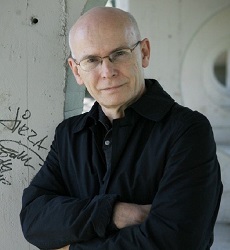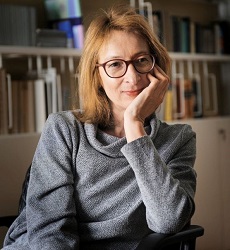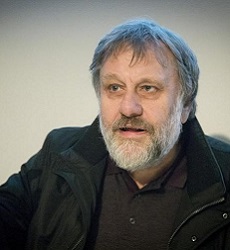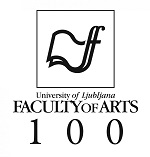|
There
will be two sessions per day, one in the morning and one in the
afternoon. For each session one of the lecturers will prepare an
extensive lecture with plenty of time for discussion.
|
Monday, 26.8.
|
Tuesday, 27.8.
|
Wednesday, 28.8.
|
Thursday, 29.8.
|
Friday, 30.8.
|
8:30-9:30
|
Registration |
|
|
|
|
9:00-10:00
|
Morning coffee
|
| 10:00-13:00 |
Introduction,
Slavoj
Žižek
|
Mladen
Dolar
|
Alenka
Zupančič |
Slavoj
Žižek |
Mladen
Dolar |
13:00-14:30
|
Break
|
14:30-15:30
|
Afternoon coffee
|
15:30-18:30
|
Alenka
Zupančič |
Slavoj
Žižek |
Mladen
Dolar |
Alenka
Zupančič |
Concluding plenary
session with all three lecturers |
All three lecturers will present their latest and newest work. The
working language will be English.
Slavoj Žižek
HEGEL WITH NEURALINK
The lectures will as their entry point take Neuralink, an
American neuro-technological company, founded by Elon Musk
and eight others, dedicated to developing a mind-machine interface
(MMI). Thus first, when our brain is connected to digital machines, we
would be able to cause things to happen in reality just by thinking
about them (I direct my thought at the TV screen, and the selected
program starts to play, etc.); then, my brain could be directly
connected to another brain, so my thoughts would be shared by another
individual (I daydream about an intense sexual experience, and another
individual could directly share my experience)… Whatever the (dubious,
for the time being) scientific status of this idea, it is clear that
its realization would affect the basic features of humans as
thinking/speaking beings. But how? To indicate an answer, we will turn
to a philosopher who had no idea about Neuralink: Hegel. The
lectures will address three aspects:
- the idea of Neuralink, its philosophical presuppositions and implications;
- the unconscious as the dimension which eludes Neuralink;
- Hegel with Neuralink: are we still human when we are immersed into digital Singularity?
Suggested reading
- Slavoj Žižek, Like a Thief in Broad Daylight (Penguin 2019)
- G. W. F. Hegel, The Phenomenology of Spirit (several translations)
Alenka Zupančič
THE REAL AND ITS PASSIONS
The lectures will as their starting and focal point take the concept of
the Real that emerged in psychoanalytic theory (Freud, Lacan).
Unassimilable to the notions of reality, being, or truth, with which it
is often confused, this singular concept above all refers to an
impasse, impossibility, hindrance inherent to the symbolic structures,
without being symbolic itself. Exploring several key features of this
concept of the Real, the lectures will attempt to specify what kind of
‘realism’ (and what kind of opposition to ‘nominalism’) follows from it
in the context of contemporary philosophical debates. We will attempt
to do so through a series of analyses of concrete phenomena pertaining
to different, albeit related ‘fields’: politics, ethics, art,
sexuality. The focus will also be on ‘passions’ (affects) that appear
and circulate as correlates of this real, its signals.
Suggested reading
- Sigmund Freud, “Civilization and its Discontents” (many editions, SE, vol. XXI)
- Sigmund Freud, “Negation” (SE, vol. XIX)
- Jacques Lacan, The Ethics of Psychoanalysis (Routledge 1992), chapters II, IV, V, IX, X, XIV.
- Clément Rosset, The Real and its Double (Seagull Books 2012)
- Paolo Virno, Déjà vu and the end of history (Verso 2015)
- Alenka Zupančič, What is sex? (MIT 2017), pp.73-84 ('Realism in psychoanalysis')
Mladen Dolar
WHAT, IF ANYTHING, IS THE OTHER?
A quick diagnosis of our times can be summed up by the decline of what
in psychoanalysis is called the big Other. The traditional authorities
have lost their sway, there has been a stark decline of the paternal
function in the last century; traditional institutions have lost their
authority; laws and the moral precepts have become negotiable; the
transcendental guarantees have met their demise; the public domain has
shrunk. The old type of Masters has increasingly been supplanted
by a new type of obscene populist leaders. The big Other, the supposed
backbone of the symbolic order, seems to be in big trouble. Still, this
wide-spread diagnosis, which can take very different shapes, is too
quick and misleading. The lectures will attempt to explore the
psychoanalytic notion of the big Other, given the paradox that on the
one hand it is absolutely necessary and on the other, according to
Lacan, it is lacking – how can it be both at the same time? The problem
of contemporary authority will be singled out against the background of
Hegelʼs classical takes and then by e. g. Max Weber and Hannah Arendt;
the problem of rumors, of what can be called the present rumorization
of the social, will be considered in its relation to the sturdiness and
the fickleness of the Other; the problem of the Other in the time of
social media; furthermore, the problem of irony, being one of the key
contemporary attitudes, in its relation to negativity and the status of
negation.
Suggested reading
- Samuel Beckett, Worstward Ho (Grove Press 1983, a number of editions)
- Jacques Lacan, The other side of psychoanalysis (Norton 2007)
- Hannah Arendt, “What is authority?” (in Between past and future, Penguin 2006, many editions)
- Paolo Virno, An essay on negation (Seagull Books 2018)
- Richard Bernstein, Ironic life (Polity Press 2016)
- G. W. F. Hegel, “The master-slave dialectic” (the chapter in the Phenomenology of Spirit, many editions)
|
Mladen Dolar
is Professor and Senior Researcher at the Department of Philosophy,
University of Ljubljana. His principal areas of research are
psychoanalysis, modern French philosophy, German idealism and art
theory. He is also Professor at the European Graduate School in
Switzerland. He has lectured extensively at universities in the United
States and across Europe and he is the author of over hundred and fifty
papers in scholarly journals and collective volumes. Apart from twelve
books in Slovene, his book publications include most notably A Voice and Nothing More (MIT 2006,
translated into six languages) and Opera’s
Second Death (with Slavoj Žižek, Routledge 2001, also translated
into several languages). His new book The
Riskiest Moment is forthcoming with Duke University Press.
Foto: Delo
|

|
|
|
Alenka Zupančič
is a Slovene philosopher and psychoanalytic social theorist. She
works as Senior Researcher at the Institute of Philosophy, Scientific
Research Center of the Slovene Academy of Sciences. She is also
Professor at the European Graduate School in Switzerland, and at the
Graduate School ZRC SAZU (Ljubljana). She is the author of numerous
articles and books on psychoanalysis and philosophy, including What is Sex? (MIT Press 2017), The Odd One In: On Comedy (MIT
Press 2008), The Shortest Shadow:
Nietzsche’s Philosophy of the Two (MIT Press 2003) and Ethics of the Real: Kant and Lacan
(Verso 2000). Her books have been translated into many languages.
Foto: Mladina
|

|
|
|
Slavoj
Žižek
is a Hegelian philosopher and psychoanalytic social theorist. He is
Senior Researcher at the Department of Philosophy, University of
Ljubljana; Professor at the School of Law, Birkbeck, University of
London; Distinguished Scholar at the Kyung Hee University, Seoul; and
Visiting Professor at the German Department, New York University. His
field of work comprises psychoanalytic theory, dialectical-materialist
interpretations of German Idealism and Marxist critique of ideology.
His more than thirty books in English have been widely translated. His
latest publications include Like a
Thief in Broad Daylight (Penguin/Allen 2018), Reading Marx (with Agon Hamza and
Frank Ruda, Polity 2018), Incontinence
of the Void (MIT Press 2017), and Lenin 2017 (Verso 2017).
Foto: Siol
|

|
|
|



